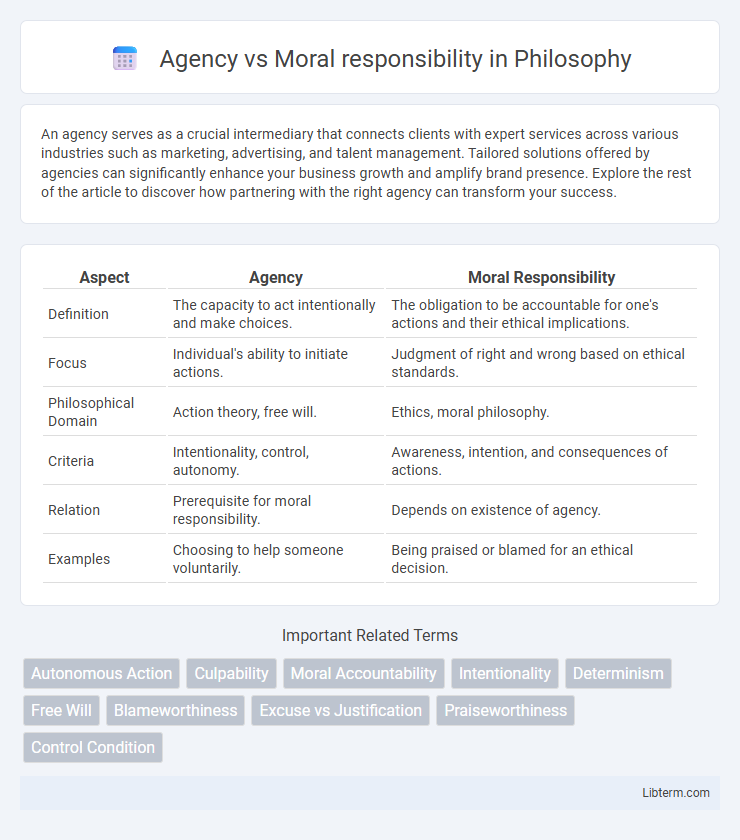An agency serves as a crucial intermediary that connects clients with expert services across various industries such as marketing, advertising, and talent management. Tailored solutions offered by agencies can significantly enhance your business growth and amplify brand presence. Explore the rest of the article to discover how partnering with the right agency can transform your success.
Table of Comparison
| Aspect | Agency | Moral Responsibility |
|---|---|---|
| Definition | The capacity to act intentionally and make choices. | The obligation to be accountable for one's actions and their ethical implications. |
| Focus | Individual's ability to initiate actions. | Judgment of right and wrong based on ethical standards. |
| Philosophical Domain | Action theory, free will. | Ethics, moral philosophy. |
| Criteria | Intentionality, control, autonomy. | Awareness, intention, and consequences of actions. |
| Relation | Prerequisite for moral responsibility. | Depends on existence of agency. |
| Examples | Choosing to help someone voluntarily. | Being praised or blamed for an ethical decision. |
Defining Agency and Moral Responsibility
Agency refers to the capacity of individuals to act independently, make choices, and impose those choices onto the world, reflecting intentionality and autonomy. Moral responsibility involves the ethical accountability an individual holds for their actions based on the awareness of right and wrong, and the ability to control those actions according to moral norms. Defining agency requires understanding the cognitive and volitional faculties that enable decision-making, while moral responsibility hinges on the presence of intentionality and the capacity to comprehend the moral implications of one's actions.
Historical Perspectives on Agency
Historical perspectives on agency reveal its evolution from deterministic views in ancient philosophy to more nuanced understandings emphasizing individual autonomy and moral responsibility. Early thinkers like Aristotle linked agency to rationality and virtue, while Enlightenment philosophers such as Kant highlighted moral agency through free will and duty-bound actions. Modern debates incorporate social and psychological factors, recognizing that agency involves navigating constraints while maintaining accountability for ethical decisions.
The Philosophical Roots of Moral Responsibility
The philosophical roots of moral responsibility trace back to debates on agency, emphasizing an individual's capacity to act intentionally and make choices based on rational deliberation. Key figures like Aristotle and Kant highlight autonomy and moral agency as prerequisites for holding individuals accountable for their actions. Contemporary philosophy further explores compatibilism and incompatibilism, examining how free will intersects with determinism to define the boundaries of moral responsibility.
Interplay Between Free Will and Agency
The interplay between free will and agency is central to understanding moral responsibility, as agency requires the capacity to make autonomous choices free from external coercion. Free will enables individuals to deliberate and select actions based on personal values, thereby grounding moral accountability. When agency is compromised, such as in cases of coercion or impaired cognition, moral responsibility is correspondingly diminished.
Determinism’s Challenge to Moral Accountability
Determinism challenges moral accountability by asserting that all human actions are pre-determined by prior causes, thereby undermining the notion of agency as free will. Without genuine agency, individuals cannot be held morally responsible for actions that inevitably follow from preceding events and natural laws. This raises critical questions on how legal and ethical systems assign praise or blame in a deterministic framework.
Psychological Foundations of Moral Responsibility
Agency in moral responsibility hinges on an individual's capacity to act intentionally and understand the consequences of their actions. Psychological foundations emphasize cognitive processes such as moral reasoning, self-control, and awareness, which enable individuals to evaluate and regulate behavior according to ethical standards. Research in developmental and social psychology highlights the role of empathy and theory of mind in attributing moral agency and responsibility, linking internal mental states to accountable actions.
Social and Cultural Influences on Agency
Social and cultural influences shape individual agency by providing the norms, values, and expectations that guide moral decision-making processes. These external factors impact how people perceive their own capacity for choice and accountability, often embedding a collective dimension into personal responsibility. Variations in cultural frameworks highlight differing conceptions of agency, revealing that moral responsibility is not only an individual attribute but also a socio-cultural construct.
Legal Implications: Assigning Responsibility
Legal implications of agency versus moral responsibility center on the allocation of accountability for actions within a legal framework. Agency establishes a clear legal relationship where an agent acts on behalf of a principal, making the principal liable for the agent's conduct under doctrines like respondeat superior. Moral responsibility influences but does not directly determine legal liability, as courts primarily assign responsibility based on statutory laws, contracts, and evidence of agency relationships.
Agency in Collective and Organizational Contexts
Agency in collective and organizational contexts involves the capacity of groups or entities to make decisions and act intentionally, shaping outcomes beyond individual contributions. Collective agency emerges through coordinated efforts, shared goals, and institutional structures that enable organizations to respond adaptively to complex environments. This distributed agency challenges traditional notions of moral responsibility by attributing accountability to the organization as a whole rather than solely to individual members.
Contemporary Debates: The Future of Moral Responsibility
Contemporary debates on agency and moral responsibility emphasize evolving perspectives about autonomy in increasingly complex social and technological environments. Advances in neuroscience and artificial intelligence challenge traditional notions of free will and accountability, prompting reexamination of how moral responsibility is attributed to both humans and machines. Ethical frameworks are being developed to accommodate these shifts, ensuring that responsibility remains meaningful in future contexts of agency.
Agency Infographic

 libterm.com
libterm.com